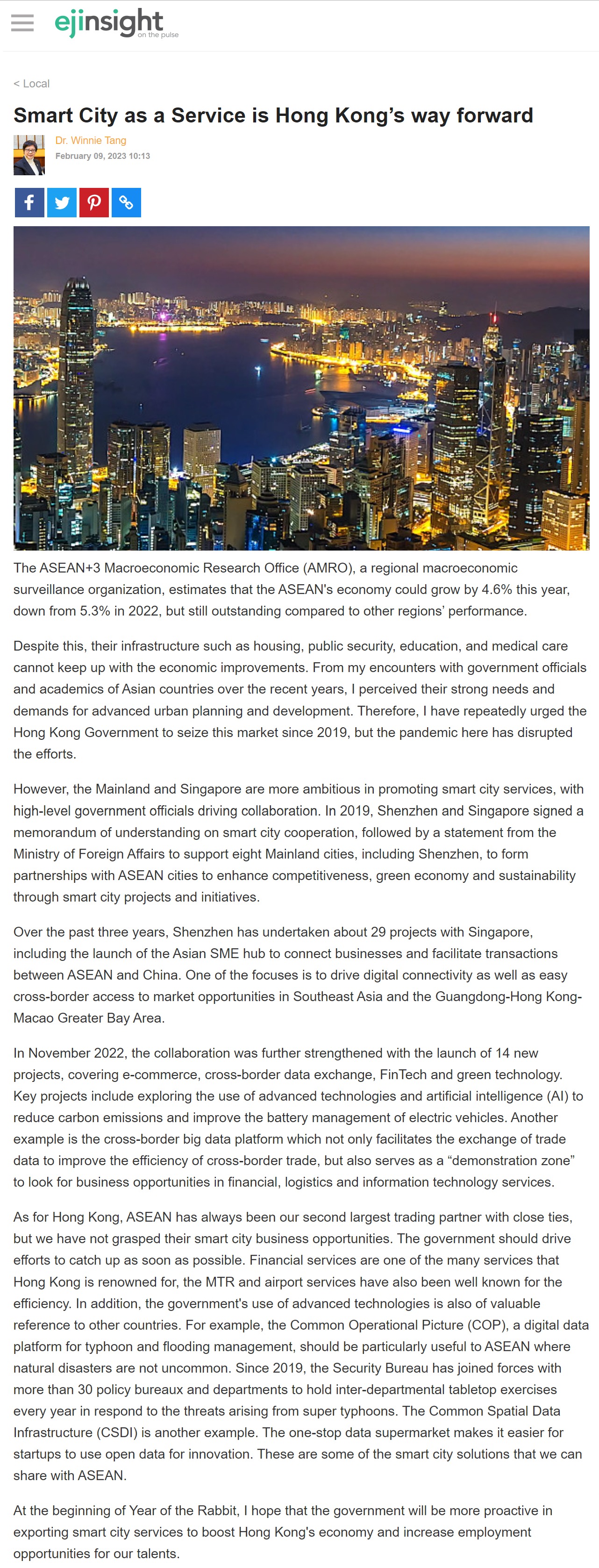網上版請按此

Smart City as a Service is Hong Kong's way forward
The ASEAN+3 Macroeconomic Research Office (AMRO), a regional macroeconomic surveillance organization, estimates that the ASEAN's economy could grow by 4.6% this year, down from 5.3% in 2022, but still outstanding compared to other regions' performance.
Despite this, their infrastructure such as housing, public security, education, and medical care cannot keep up with the economic improvements. From my encounters with government officials and academics of Asian countries over the recent years, I perceived their strong needs and demands for advanced urban planning and development. Therefore, I have repeatedly urged the Hong Kong Government to seize this market since 2019, but the pandemic here has disrupted the efforts.
However, the Mainland and Singapore are more ambitious in promoting smart city services, with high-level government officials driving collaboration. In 2019, Shenzhen and Singapore signed a memorandum of understanding on smart city cooperation, followed by a statement from the Ministry of Foreign Affairs to support eight Mainland cities, including Shenzhen, to form partnerships with ASEAN cities to enhance competitiveness, green economy and sustainability through smart city projects and initiatives.
Over the past three years, Shenzhen has undertaken about 29 projects with Singapore, including the launch of the Asian SME hub to connect businesses and facilitate transactions between ASEAN and China. One of the focuses is to drive digital connectivity as well as easy cross-border access to market opportunities in Southeast Asia and the Guangdong-Hong Kong-Macao Greater Bay Area.
In November 2022, the collaboration was further strengthened with the launch of 14 new projects, covering e-commerce, cross-border data exchange, FinTech and green technology. Key projects include exploring the use of advanced technologies and artificial intelligence (AI) to reduce carbon emissions and improve the battery management of electric vehicles. Another example is the cross-border big data platform which not only facilitates the exchange of trade data to improve the efficiency of cross-border trade, but also serves as a "demonstration zone" to look for business opportunities in financial, logistics and information technology services.
As for Hong Kong, ASEAN has always been our second largest trading partner with close ties, but we have not grasped their smart city business opportunities. The government should drive efforts to catch up as soon as possible. Financial services are one of the many services that Hong Kong is renowned for, the MTR and airport services have also been well known for the efficiency. In addition, the government's use of advanced technologies is also of valuable reference to other countries. For example, the Common Operational Picture (COP), a digital data platform for typhoon and flooding management, should be particularly useful to ASEAN where natural disasters are not uncommon. Since 2019, the Security Bureau has joined forces with more than 30 policy bureaux and departments to hold inter-departmental tabletop exercises every year in respond to the threats arising from super typhoons. The Common Spatial Data Infrastructure (CSDI) is another example. The one-stop data supermarket makes it easier for startups to use open data for innovation. These are some of the smart city solutions that we can share with ASEAN.
At the beginning of Year of the Rabbit, I hope that the government will be more proactive in exporting smart city services to boost Hong Kong's economy and increase employment opportunities for our talents.
Dr. Winnie Tang
Adjunct Professor, Department of Computer Science, Faculty of Engineering; Department of Geography, Faculty of Social Sciences; and Faculty of Architecture, The University of Hong Kong